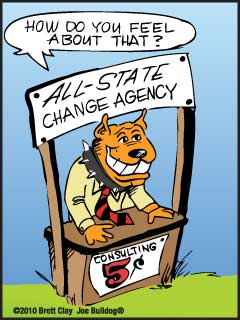Change Leadership — Secret # 11
Be An Amateur Psychologist
Whatever you cannot understand, you cannot possess. —Johann Wolfgang Von Goethe
What I Need to Know |
To be an effective change leader, you must have a deep understanding of the psychology of change.
Change is not easy. If it were easy, we all would have transformed ourselves into perfect beings. In fact, change is quite difficult. The difficulty lies in our ability to let go of the current situation and venture into a new, unknown situation. That process is the psychology of change.
An understanding of the psychology of change helps you find answers to the key questions that confront the change leader:
- What does the customer want to change?
- Why does the customer want to change?
- What does the customer really want? What is the customer’s ultimate goal?
- What is preventing the customer from changing? Why has she not already changed?
- What motivates the customer? What makes the customer “tick”?
- What is involved in making the change? What will it take?
- How will the customer behave before, during, and after the change?
- Be a student of the People.
- Put yourself in their shoes.
- Develop an infinite curiosity and appreciation for people.
What I Need to Do |
It is not necessary to be trained formally as a clinical psychologist. You do not have to be able to make diagnosis from the DSM III. But to be an outstanding change leader, you must be an earnest student of people’s behavior and thinking. That is your remaining competitive edge over the Internet and your global competitors.
To gain more insight into the psychology of change, I recommend you read my book, Forceful Selling.
To gain more insight into how people think and behave, I recommend you read Please Understand Me II by David Keirsey. You will find Keirsey’s descriptions of sixteen types of personalities very insightful and useful.
Do this exercise the next time you are in a public place: Look around the room and identify five different people. Ask yourself a number of the seven “W questions” for each, for example, Why is that person here? What was the first thing that person thought when he awoke this morning? Where does that person want to go in her life? What is the biggest change he will make this month?
Action Summary |
|
|
 |



Social